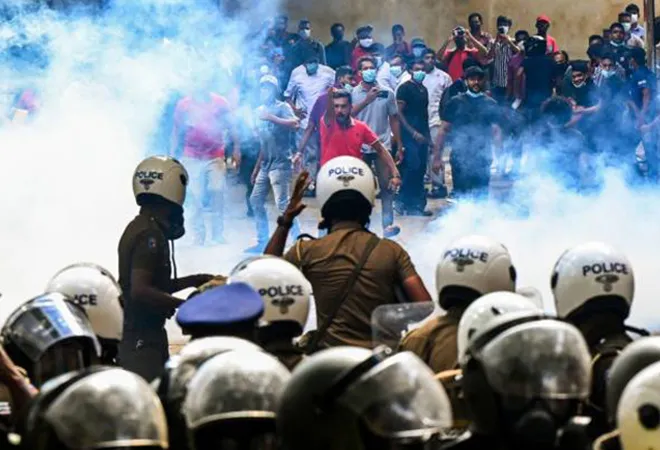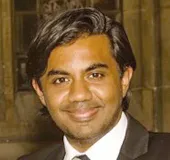-
CENTRES
Progammes & Centres
Location
Despite the desperate attempts made by President Gotabaya to retain power, the country managed to oust him and take nascent steps towards re-democratisation.

This piece is part of the series, The Unfolding Crisis in Sri Lanka.
The 9th of July was a momentous day in the history of Sri Lankan politics as the protestors broke into President Gotabaya Rajapaksa’s office and residence and forced him to announce his resignation.
Despite the worsening of the economic crisis over the past few months, the Sri Lankan President chose to secure his position as President by using the military to keep the protestors at bay instead of addressing the root issues of the crisis. There was a danger in this exercise and it clearly failed, as protestors took over the President’s residence and office and the Prime Minister’s office. The President hoped for a quick solution by recruiting a liberal democrat, Prime Minister Wickremasinghe—who is the current President of Sri Lanka after Gotabaya Rajapaksa took refuge in the Maldives.
The economic crisis has triggered multiple social concerns and has led to an eruption of violence.
The nation had come to a screeching halt as it faced fuel and food shortages; a two-week shutdown was announced for government offices and schools. The economic crisis has triggered multiple social concerns and has led to an eruption of violence. A few weeks ago soldiers fired shots into the air to control the situation at a fuel station in Sri Lanka as tensions flared up. Six policemen were injured at another fuel station. More than 40 houses of parliamentarians were burnt by protestors last month. Even though the protests were taking a turn for the worse, the newly appointed Prime Minister was more focused on rebuilding houses for parliamentarians instead of addressing the food crisis and deteriorating economic conditions. The Rajapaksa political strategist Basil Rajapaksa, the former Finance Minister, resigned from political office, paving way for casino owner, Dammika Perera to take his parliamentary seat. Thus indicating that political favouritism continued despite the protests. A strong warning was also released by Wimal Weerawansa saying if protest demands are not taken seriously, the next attack will target the country's affluent class. “They will attack everyone using luxury vehicles and those living in luxury homes. That is the inevitable future if the government keeps playing games with the crises,”—a warning directed toward a possible full-blown insurrection due to the dire humanitarian crisis. With the military in the forefront, multiple arrests of protestors and main opposition parties boycotting the Parliament, the crisis in Sri Lanka is steadily getting out of control.
President Gotabaya of Sri Lanka had chosen the prime minister as the housekeeper to clean up the autocratic house and decorate it with democracy. Rajapaksa’s modern authoritarian rule fits well with the five dimensions of authoritarian rule outlined by Steven Kotkin, a Political Science Professor at Yale. First, there is the use of a coercive mechanism with heavy militarisation in more than 15 sectors of the nation and the stealth operation of force and brutality using the Prevention of Terrorism Act (PTA)—the anti-terror act—for multiple arrests. Second, revenue streams to sustain the social contract between the government and the public were affected, through policies such as the sudden switch to organic farming. The regime understood that they had broken the social contract and did not admit the policy blunders until the government fell. Third, the state-controlled different facets of life by forcibly taking over minority land, forcing cremation, making extra-jurisdictional arrests, and interfering with law and order. The State cast a dark shadow in the lives of the public; any opposition or criticism of the regime was not well-received and adversely affected those individuals who chose to display their dissent. Fourth, there were stories and narratives spun to weaponise nationalism to achieve the regime’s political objectives, accusing internal/external interventions and portraying it as a national security threat. The narrative was constructed in a way to display that national greatness was under threat and Rajapaksa was there to defend it. These stories had power and were effectively amplified using pro-Rajapaksa private media outlets. Fifth, the regime justified its China-tilt by orchestrating a narrative that demonised the West for its continued questioning of the human rights violations by the Sri Lankan state. The new leadership will have a herculean task to rebalance the foreign policy and work on all five dimensions to neutralise and re-democratise the nation.
The State cast a dark shadow in the lives of the public; any opposition or criticism of the regime was not well-received and adversely affected those individuals who chose to display their dissent.
President Gotabaya Rajapaksa made a three-way political agreement to survive. He appointed Ranil Wickremasinghe as the prime minister. Second, he got Rajapaksa’s political party, SLPP, to support the new prime minister. And in return, he got Ranil Wickremasinghe to secure his political survival. Wickremasinghe, an experienced politician with a close understanding of the internal political dynamics of intra-party politics, immediately launched his campaign to win the confidence of the Parliament and the public for his own political survival. The new prime minister first blamed the media for appointing a president like Gotabaya; then he frontloaded a moral dilemma, making it clear that if the protestors disturb him and the new regime, the situation would only worsen. The moral dilemma was a carefully orchestrated strategy pushing forward an early warning to avoid a food security crisis if all political parties and the public did not support him.
There were immediate constitutional amendments suggested by the Prime Minister; the 20th Amendment that was introduced by Gotabaya Rajapaksa in 2020 to divert power towards the executive presidency, was to be reversed by Wickremasinghe with the 21st Amendment, transferring considerable power to the prime minister. However, according to a civil society activist and academic, Dr Jehan Perera, “the 21st amendment does not significantly reduce the President’s powers in the manner that was originally anticipated”.
Wickremasinghe has risked his political career siding with Rajapaksas, clearly understanding the difficulty of detaching and breaching the internal agreement with the Rajapaksa brothers.
Structural adjustment amidst a political and economic crisis is a solution to stabilise the situation. The concern is that the internal deal-making politics of Rajapaksa and Wickremasinghe provide no solution for the present crisis. The protest continued with the primary condition unchanged, with the ‘GotaGoHome’ slogan. Wickremasinghe has risked his political career siding with Rajapaksas, clearly understanding the difficulty of detaching and breaching the internal agreement with the Rajapaksa brothers. Rajapaksas came with a huge baggage: The corruption scandals, human rights violations, etc. all of which Wickremasinghe had to defend. To win political support in the Parliament, Wickremasinghe relied on the parliamentarians who backed the Rajapaksas. Wickremasinghe is walking on a political tightrope and requires rapid assistance from the International Monetary Fund (IMF) to stabilise the economy and simultaneously re-democratise the nation. However, the IMF is still on the staff-level agreement and there is much to be done before the funding agreement can come through. Further delay in the IMF relief fund will cost lives and cause more public outrage.
Behind the constitutional façade is an attempt to create the illusion of better governance through structural changes. What is immediately required is political stability to achieve economic stability, and the willingness to concede to the demands made by the protestors to bridge the trust deficit between the public and policy-makers. The Opposition leader Sajith Premadasa and other opposition party leaders have announced that they are willing to give leadership to an interim all-party regime. This could be the first step to re-democratise the nation.
The views expressed above belong to the author(s). ORF research and analyses now available on Telegram! Click here to access our curated content — blogs, longforms and interviews.

Asanga Abeyagoonasekera is an international security and geopolitics analyst and strategic advisor from Sri Lanka. He has led two government think tanks providing strategic advocacy. ...
Read More +